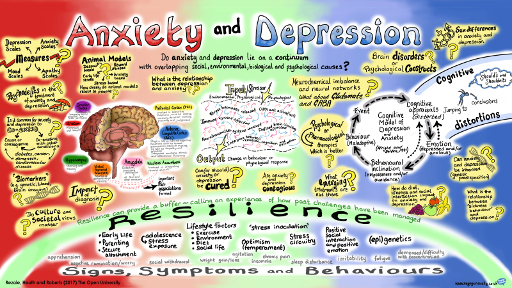Conclusion
Use the visual summaries below to reflect on your learning for this section (see ‘Anxiety and Depression’) and the course as a whole (see ‘The Whole Picture’). Key questions that remain to be explored are highlighted in Box 1. The visual summaries span the ‘trajectory’ from anxiety over on the left to depression to the right, presenting an overview of themes and discussion points taken from this course and new areas that you may wish to explore.

We have provided you with a larger version of this image in PDF format [Tip: hold Ctrl and click a link to open it in a new tab. (Hide tip)] .
We have provided you with a larger version of this image in PDF format.
Box 1 Some key questions around anxiety and depression
Do anxiety and depression lie along a ‘continuum’ of human emotions?
Is it common for anxiety and depression to co-exist?
What is the impact of diagnosis?
Do culture and societal views matter?
Are anxiety and depression ‘contagious’?
Are they brain disorders or psychological constructs?
Are ‘biomarkers’ (e.g. genetic, blood, brain imaging) of any relevance to anxiety and depression?
Where do glutamate and GABA feature in our understanding of the neurobiology of affective disorders?
What is the relationship between anxiety and fear?
Are ‘sickness behaviour’ and depression related conditions?
Can anxiety and depression be inherited (are we genetically predisposed)?
How do diet, lifestyle and social interactions impact on anxiety and depression?
How closely do animal models for mood disorders relate to people?
Anxiety and depression can co-exist with other conditions such as diabetes, cancer, cardiovascular disease or dementia; are mood disorders a cause or consequence of the illness?
Can (or should) anxiety and depression be ‘cured’?
Which is better − psychological or pharmacological therapies?
What emerging treatments are out there?
We hope you have enjoyed your learning on this course. If you would like to continue your studies with the Open University, we offer courses at undergraduate and postgraduate level in this area (please refer to www.open.ac.uk/ courses/). After completing this course, you should also be better prepared to move on to the MSc in Mental Health Science. You can find out more by visiting www.open.ac.uk/ postgraduate/ qualifications/ f78. We wish you the very best for your future studies.

